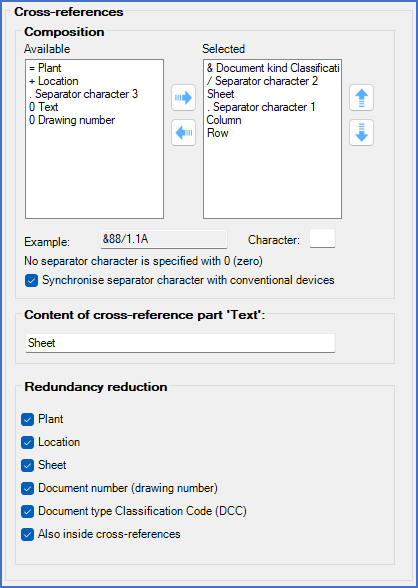|
<< Click to Display Table of Contents >> Sheet numbering and cross-references |
  
|
|
<< Click to Display Table of Contents >> Sheet numbering and cross-references |
  
|
Since the sheet numbering will be made individually for each DCC code (like separately for EFS and for other codes, including the counting number when applicable), cross-references between drawing sheets need to include the DCC code. Otherwise, you would end up with ambiguous cross-references, for example referring to sheet 2, when there in fact are multiple sheets with sheet number 2.
In the simple examples presented above, you can see that the sheet numbers are individual for each document code, where the document code is made up of up to six characters:
•Area, 1 character
•Main class, 1 character
•Sub-class, 1 character
•Counting number, 3 characters
The composition of the cross-references is as follows:

Figure 586: Cross-reference composition and redundancy reduction
Displayed in another way, the composition is:
&Document_class_code / Sheet_number . Column Row
Example:
&EFS/5.3C
Redundancy reduction is active for both document class code and sheet number. This means that when referring within the same document class code like from one circuit diagram to another, the document class code is omitted. The same is true for sheet number, so that references within the same sheet will not contain neither document class code nor sheet number. Typical example:
/.3C
The mask and the drawing frame are adapted for the implementation by including the complete document class code in the title field, as well as the drawing frame name and the individual parts of the document class code.
All details about the drawing frame and the mask are described in the Drawing frame and mask sub-topic.